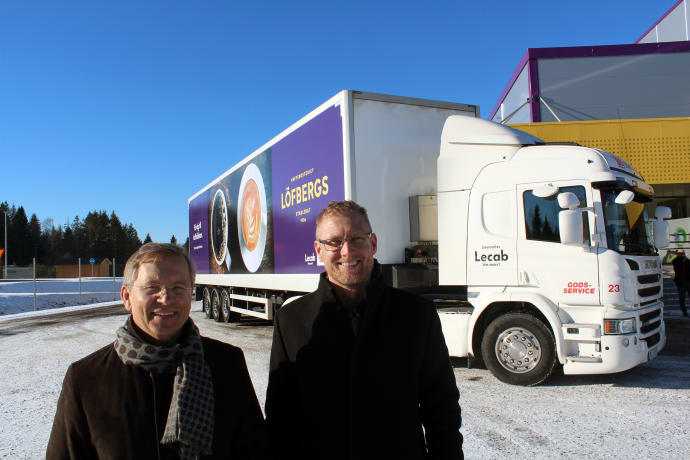KARLSTAD, Sweden – It is strong as an elephant, quiet as a mouse, and it reduces carbon emissions with up to 92 per cent. Scania’s new plug-in hybrid made its first appearance in Sweden last week.
The maiden journey took place in Karlstad, where it transports coffee between Löfbergs’s roasting house in central Karlstad and the new warehouse in Välsviken.
– It feels great that we and Karlstad are first with using this unique climate-smart solution. It is completely in line with our ambition of being the most sustainable coffee roaster in Europe, says Lars Appelqvist, CEO at Löfbergs.
The plug-in hybrid is the first of its kind and runs on HVO (fossil-free diesel) or electricity. It is based on a new technology developed by the truck manufacturer Scania. The technology leads to a decrease in fuel consumption and a reduction in carbon emissions with up to 92 per cent. Great environmental advantages in other words.
– Transports are a large source of the fossil carbon emissions, and it therefore feels so good to present news that contribute to reducing the emissions, says Robert Sobocki, CEO at Scania-Bilar Sverige.
Another advantage is that the Scania hybrid can run completely on electricity on some distances, which makes it almost totally soundless. It means that it can be used in city centres and densely built-up areas in the morning, evening and night without disturbing the residents. It is also more fuel-efficient than previous solutions.
Most climate-smart solution
Löfbergs is one of the largest coffee roasters in the Nordic countries and produces more than 10 million cups of coffee – a day.
A new warehouse was inaugurated in the outskirts of Karlstad in 2016 to prepare for future expansion.
The roasting still takes place in the “coffee scraper” in central Karlstad. The green coffee comes from all over the world and is transported first by boat to Gothenburg, and then by train all the way into the roasting house.
– Even if the transport is responsible for only three per cent of the coffee’s climate effect, we are doing everything we can to minimize the environmental effects.
In the long run, we hope to be able to transport the coffee by train between the roasting house and the warehouse, but this is the most climate-smart solution available today, says Lars Appelqvist.
In the picture: Robert Sobocki, CEO at Scania-Bilar Sverige (left) and Lars Appelqvist, CEO at LÖfbergs.


















